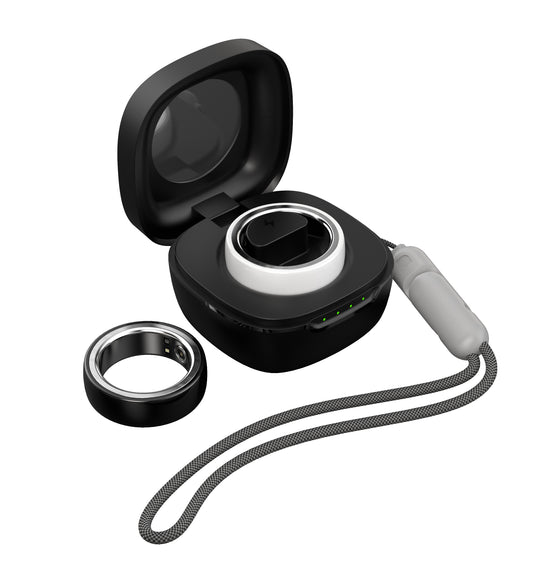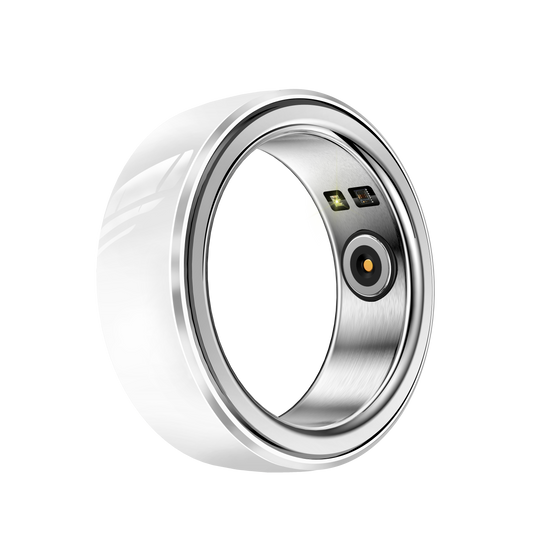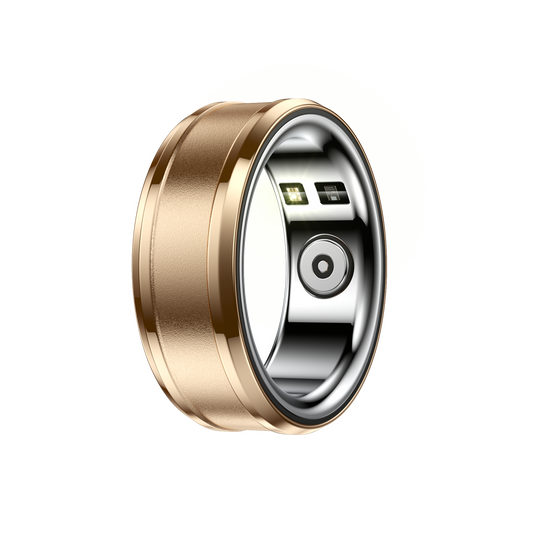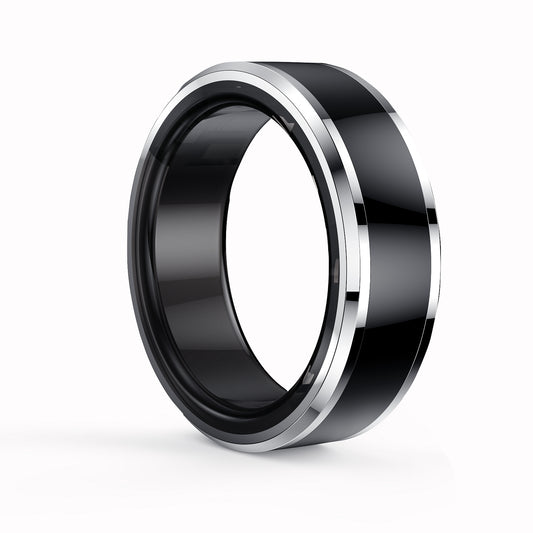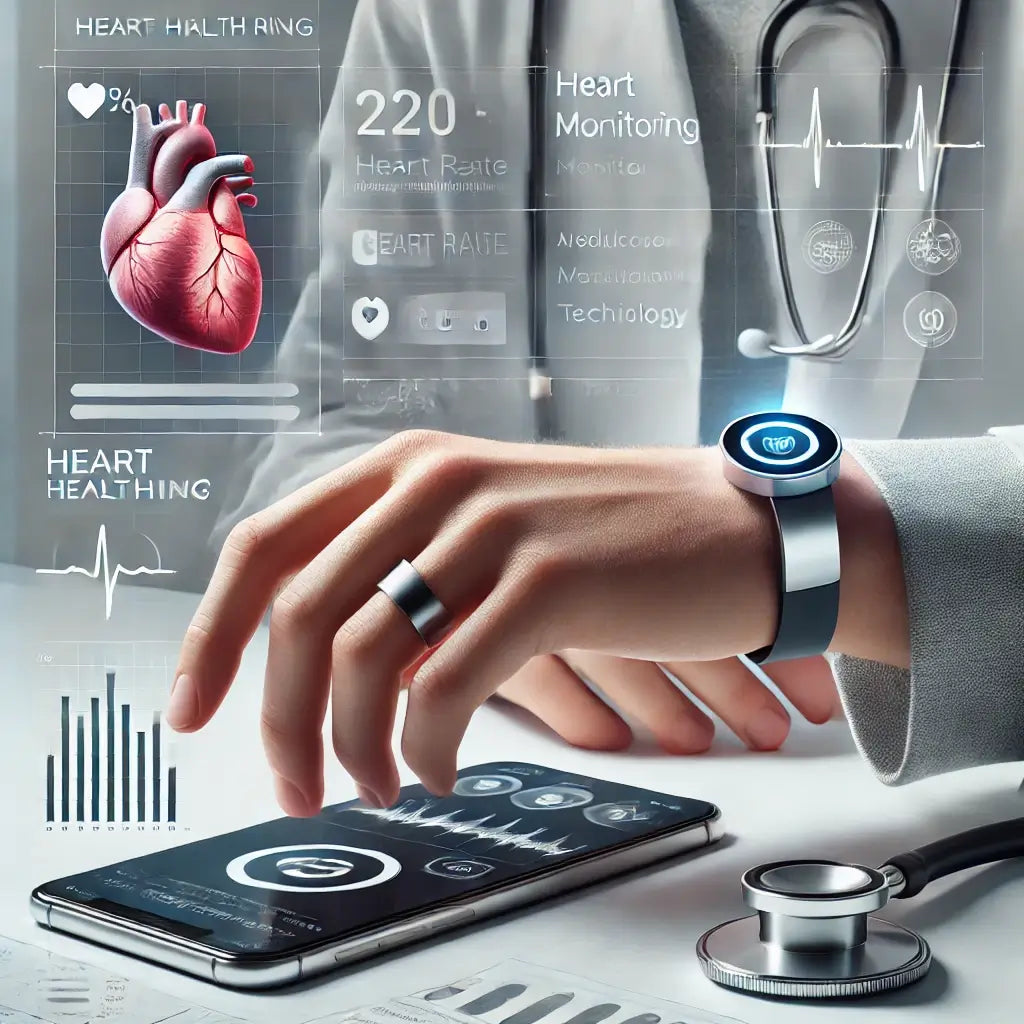
Smart Rings and Heart Health: How Heart Rate Monitoring Can Save Lives
Share
Introduction
Heart health is a key part of your overall health, and monitoring your heart rate plays an extremely important role in it. With the development of wearable technology, modern devices such as smart rings have become invaluable tools for tracking the condition of our heart. Smart rings offer the ability to monitor your heart rate in real time, which can help detect health problems early and prevent serious heart diseases.
The purpose of this article is to introduce readers to the importance of heart rate monitoring and the role that smart rings can play in everyday heart health. We will present the benefits of using these modern devices, present user stories, and discuss the opinions of experts in the field of cardiology. We invite you to read and discover how wearable technology can help you take care of your heart health and, in some cases, even save lives.
The importance of heart health
Brief description of heart diseases
Heart diseases are one of the leading causes of death worldwide. These include various diseases such as coronary artery disease, heart failure, arrhythmias and heart attacks. Coronary artery disease is the result of narrowing of the coronary arteries that supply blood to the heart muscle, which can lead to chest pain and a heart attack. Heart failure occurs when the heart is unable to pump enough blood to meet the body's needs. Arrhythmias are heart rhythm disturbances that can lead to serious health problems, including sudden cardiac death.
Why heart rate monitoring is important
Monitoring your heart rate is crucial for the early detection and management of heart disease. Regularly tracking your heart rate can help identify abnormalities, such as too high or too low a heart rate, that may be an early sign of health problems. By regularly monitoring our heart rate, we can better understand how our heart responds to various situations, such as exercise, stress or rest.
Smart rings, equipped with advanced sensors, enable real-time heart rate monitoring. This allows you to quickly detect deviations from the norm and take appropriate actions, such as consulting a doctor or changing your lifestyle. Additionally, data collected by smart rings can be analyzed over a longer period of time, enabling a better understanding of health trends and more precise management of heart health.
Modern wearable technology, such as smart rings, offers new possibilities in the field of heart health monitoring. Thanks to it, we can proactively take care of our health, minimizing the risk of serious cardiovascular diseases. Regularly monitoring your heart rate is one of the simplest and most effective ways to maintain a healthy heart and improve your quality of life.
Smart ring technology
How smart rings work
Smart rings are advanced wearable devices that combine elegant design with modern health monitoring technologies. They work by collecting the user's biometric data and sending it to a mobile application, where it is analyzed and presented in a clear way. This way, users can track their health parameters in real time and analyze long-term trends.
Smart rings are usually equipped with several key components, such as biometric sensors, a Bluetooth module for communication with the phone, a battery and a processor. Thanks to these elements, they can monitor various aspects of health and physical activity, providing users with valuable information that helps them better manage their health.
Types of sensors used to monitor heart rate
To monitor heart rate, smart rings use various types of biometric sensors that provide accurate and reliable measurements. Here are some of the most commonly used technologies:
-
Optical sensors : The most common type of sensors used in smart rings are optical sensors, also known as photoplethysmography (PPG). They work by emitting green or red light onto the user's skin and measuring the amount of light reflected. Changes in the amount of reflected light are caused by blood flow, which allows you to monitor your heart rate. Optical sensors are popular due to their accuracy and low power consumption.
-
ECG sensors : Some advanced smart rings are equipped with electrocardiography (ECG) sensors that measure the electrical activity of the heart. ECG sensors are more precise than optical sensors and can provide detailed information about the heart rhythm. This makes them particularly useful in detecting arrhythmias and other heart rhythm disorders.
-
Bioimpedance sensors : This technology measures the electrical resistance of body tissues, which allows for the assessment of various health parameters, including heart rate. Bioimpedance sensors can provide additional information such as hydration levels and body composition.
-
Multi-function sensors : Many modern smart rings use a combination of different sensors to provide comprehensive health monitoring. The combination of optical, ECG and bioimpedance sensors allows for more accurate measurements and a better understanding of the user's health condition.
Smart ring technology is constantly evolving, and new innovations in the field of biometric sensors allow for even more precise and comprehensive health monitoring. This makes smart rings an invaluable tool in everyday heart health care, offering users the ability to track key health parameters in real time.
Benefits of monitoring your heart rate with smart rings
Early detection of heart problems
One of the most important benefits of monitoring your heart rate with smart rings is the ability to detect heart problems early. Regular real-time heart rate tracking allows you to quickly identify abnormalities such as arrhythmias, tachycardia (fast heart rate) or bradycardia (too slow heart rate). This allows users to quickly respond to potential health threats and consult a doctor for further diagnosis and treatment. Early detection of heart problems can prevent serious complications and save lives.
Monitoring physical activity and rest
Smart rings not only monitor your heart rate, but also track your physical activity and the quality of your rest. Thanks to this, users can better manage their lifestyle and adjust the intensity of exercise to their health needs. Monitoring your heart rate while exercising helps determine whether your training is intense enough to provide health benefits or whether you should reduce the intensity to avoid overtraining. Additionally, tracking your heart rate during rest and sleep allows you to assess your body's recovery and identify factors that may affect your sleep quality.
Track long-term health trends
One of the key aspects of monitoring your heart rate with smart rings is the ability to track long-term health trends. Data collected by smart rings is stored and analyzed, allowing the identification of changes in heart condition and overall health over time. Users can see how their heart rate changes in response to various factors such as stress, diet, physical activity and lifestyle changes. This allows them to make informed decisions about their health and make changes that will bring long-term benefits.
Tracking long-term health trends is also extremely useful for doctors, who can use this data to better diagnose and treat patients. Regular heart rate monitoring using smart rings enables early detection of subtle changes in heart condition, which may be the first signal of health problems. Thanks to this, it is possible to take appropriate actions quickly, which increases the chances of effective treatment and improvement of the quality of life.
Heart rate monitoring with smart rings offers many benefits that can significantly improve users' health and well-being. Early detection of heart problems, monitoring physical activity and rest, and tracking long-term health trends are just some of them. Smart rings are a modern and effective tool in everyday care of heart health.
Examples from real life
Stories of users who have used heart rate monitoring with smart rings
Monitoring heart rate using smart rings has benefited many users around the world. Here are some inspiring stories:
-
Anna, 45, manager : Anna leads an intense lifestyle, which was often associated with great stress. After purchasing the smart ring, she began monitoring her heart rate both during the day and during sleep. As a result, she noticed that her resting heart rate was often higher than normal, especially during periods of increased stress. Anna consulted a doctor who, after additional tests, diagnosed her with early stage hypertension. By detecting the problem early, Anna changed her lifestyle and introduced regular relaxation exercises, which helped her reduce stress and improve heart health.
-
Marek, 60 years old, retired : Marek used a smart ring to monitor his heart rate during daily walks and physical activity. One day, the smart ring registered a sudden increase in heart rate, even though Marek was resting at home. Concerned, Marek contacted a doctor who diagnosed him with atrial fibrillation - a type of heart arrhythmia. Thanks to quick detection, Marek received appropriate treatment, which prevented more serious health complications.
-
Kasia, 32, programmer : Kasia used a smart ring to monitor her physical activity and sleep quality. Analyzing the data, she noticed that her heart rate was often irregular while she slept. She decided to see a specialist who, after conducting tests, diagnosed her with sleep apnea syndrome. Thanks to early detection, Kasia began treatment that significantly improved her sleep quality and overall heart health.
Analytical examples of how data from smart rings helped improve heart health
Smart rings provide valuable data that can be analyzed to better understand and manage heart health. Here are some analytical examples:
-
Heart rate monitoring : Smart rings record heart rate data 24 hours a day. Analyzing this data allows you to identify irregularities that may indicate heart rhythm problems, such as atrial fibrillation. This allows users to react quickly and consult a doctor, which can prevent serious health complications.
-
Assessment of exercise effectiveness : Data from smart rings allow you to track your heart rate during various forms of physical activity. Users can monitor how their heart rate responds to different exercise intensities, helping to optimize their workouts and avoid overtraining. Regular heart rate monitoring allows you to better adapt your training plan to your individual needs and capabilities.
-
Tracking health trends : Long-term analysis of data from smart rings enables the identification of health trends, such as an increase or decrease in resting heart rate. For example, systematic heart rate monitoring can reveal subtle changes that may indicate developing health problems. This allows users to take appropriate preventive steps before problems become serious.
-
Impact of lifestyle on heart health : Smart rings can help users understand how their lifestyle affects heart health. For example, data analysis may show that specific habits, such as diet, physical activity level, or sleep habits, have a direct impact on heart rate and overall heart health. Users can use this information to make changes that will improve their health.
Expert opinions
Quotes and opinions from cardiology specialists
Experts in the field of cardiology see the great potential of smart rings in monitoring heart health. Here are some opinions from specialists:
-
Dr. Jan Kowalski, cardiologist : "Smart rings offer patients a unique opportunity to monitor their heart rate and other health parameters in real time. Thanks to this, we can detect irregularities early and take quick actions. It is a tool that can significantly improve the quality of patient care and support him in his daily life. taking care of your heart health."
-
Prof. Anna Nowak, cardiology specialist : "Smart ring technology is a real revolution in medicine. Monitoring heart rate using these devices allows you to keep track of patients' health and make appropriate changes in their treatment. We see that patients who regularly use smart rings , are more aware of their health and more willing to follow doctors' recommendations.
-
Dr. Tomasz Zieliński, cardiologist and lecturer : "Smart rings may be particularly useful for patients with heart diseases, such as arrhythmias or hypertension. Regular monitoring of heart rate and other health parameters can help in better management of these diseases and prevent complications. It is a tool that can support patients in their daily lives and improve treatment outcomes.
Recommendations for the use of smart rings in monitoring heart health
Cardiology experts recommend the use of smart rings as an effective tool in monitoring heart health. Here are some recommendations:
-
Regular heart rate monitoring : Experts recommend that smart ring users regularly monitor their heart rate, both at rest and during physical activity. Thanks to this, you can quickly detect irregularities and consult a doctor.
-
Tracking Sleep Patterns : Sleep quality has a direct impact on heart health. Monitoring sleep patterns with smart rings can help identify sleep problems, such as sleep apnea, and make appropriate changes.
-
Long-term data analysis : Long-term health data tracking allows you to identify trends and subtle changes in heart health. Experts recommend that users regularly analyze this data and share it with doctors, allowing for more precise and effective health management.
-
Consult your doctor : Before using your smart ring, it is a good idea to consult your doctor to make sure the device is suitable for your individual health needs. Your doctor can also help you interpret the data and give you advice on what to do next.
-
Collaboration with professionals : Smart rings are an excellent tool for collaboration with medical professionals. Regularly sharing health data with your doctor allows you to better monitor your health and adapt treatment to the patient's current needs.
Expert opinions and recommendations indicate that smart rings can play a key role in monitoring heart health. Regular use of these devices allows you to detect health problems early, better manage heart disease, and improve your overall health.
The future of wearable technology in the context of heart health
New technologies and innovations in heart health monitoring
Wearable technology, including smart rings, continues to evolve, introducing new innovations that could revolutionize heart health monitoring. Here are some of the most promising technologies and innovations:
-
Advanced biometric sensors : Future smart rings will be equipped with even more advanced sensors that will enable monitoring of a wider range of health parameters. In addition to heart rate, they will be able to measure blood pressure, blood oxygen levels, heart rate variability (HRV) and other indicators of heart health.
-
ECG technology : More and more smart rings will be equipped with electrocardiography (ECG) sensors, which will allow for more accurate monitoring of heart rhythm. This will enable users to detect irregularities such as atrial fibrillation more precisely than using traditional optical sensors.
-
Integration with AI and machine learning : Artificial intelligence (AI) and machine learning will play a key role in analyzing health data collected by smart rings. AI algorithms will be able to predict potential health problems by analyzing heart rate patterns and other data, allowing for even earlier detection of heart problems.
-
Wireless charging and better battery performance : Future smart rings will feature wireless charging technologies and longer-lasting batteries, which will increase the convenience of use. Users will be able to use their devices for a longer period of time without the need for frequent charging.
-
Health ecosystems : Smart rings will be increasingly integrated with health ecosystems such as mobile applications, smart scales, blood pressure monitors and other medical devices. This will allow for comprehensive heart health monitoring and better management of health data.
Anticipated trends and developments in this field
Wearable technology in the context of heart health will develop in several key directions:
-
Personalization : Future smart rings will offer even greater customization options, both in appearance and function. Users will be able to adapt the devices to their individual needs and preferences, which will increase their effectiveness and convenience of use.
-
Integration with health care systems : Smart rings will be increasingly integrated with health care systems, which will enable doctors to monitor patients' health on an ongoing basis. Regularly sending health data to doctors will allow for better care and faster response to health problems.
-
Health education : As wearable technology develops, there will be an increasing emphasis on educating users about heart health. Awareness campaigns and educational programs will help users take full advantage of smart rings and understand how heart rate monitoring can improve their health.
-
Development of new features : Smart rings will offer more and more advanced features that will allow for even better monitoring of heart health. New technologies such as biochemical sensors may enable monitoring of blood glucose levels, cholesterol and other important health indicators.
-
Increased accessibility : Wearable technology will become more accessible to a wide range of users, both in terms of price and geography. This will allow more people to enjoy the benefits of monitoring heart health with smart rings.
The future of wearable technology in the context of heart health is exciting. New technologies and innovations will enable even more accurate monitoring and better management of heart health, helping to improve quality of life and prevent serious cardiovascular diseases.
Summary
Key conclusions
Monitoring heart health with smart rings offers a number of benefits that can significantly improve quality of life and help prevent serious cardiovascular diseases. Thanks to advanced biometric sensors, smart rings enable accurate real-time heart rate tracking, early detection of health problems and analysis of long-term health trends. Regular heart rate monitoring allows you to respond quickly to abnormalities, which can prevent serious complications and save lives.
Wearable technology, including smart rings, is constantly developing, introducing new innovations that further increase its effectiveness and comfort of use. AI integration, advanced ECG sensors, and improved battery performance are just some of the future capabilities that could revolutionize heart health monitoring.
Encouragement to use smart rings in daily monitoring of heart health
If you care about your heart health, it is worth considering using a smart ring. These modern devices offer a convenient and discreet way to monitor your heart rate and other health parameters, providing valuable information that can help you better manage your health. Regardless of whether you are an athlete, a person leading an intense lifestyle, or simply want to take care of your health, smart rings can be invaluable support.
Regular use of smart rings allows you to take a proactive approach to heart health. Thanks to them, you can better understand how your body reacts to various factors, such as stress, physical activity or lifestyle, and make informed decisions that will contribute to improving your well-being and health.
Tracking your heart rate and other health parameters with smart rings is an investment in your health that can bring long-term benefits. We encourage you to familiarize yourself with the offer of smart rings available at Inno WearTech and choose the device that best suits your needs. Thanks to modern wearable technology, you can take care of your heart health every day in a simple and effective way.
FAQ
1. What are smart rings? Smart rings are intelligent rings equipped with advanced biometric sensors that enable monitoring various aspects of health, such as heart rate, sleep quality, physical activity level and other health parameters. Thanks to their elegant design, they can be worn as everyday jewelry.
2. How do smart rings monitor heart rate? Smart rings use optical (photoplethysmographic) or electrocardiographic (ECG) sensors to monitor heart rate. Optical sensors measure changes in the amount of light reflected on the skin caused by blood flow, while ECG sensors record the electrical activity of the heart.
3. Why is heart rate monitoring important? Regular heart rate monitoring allows for early detection of health problems such as arrhythmias, tachycardia or bradycardia. Thanks to this, you can quickly react to irregularities and consult a doctor, which can prevent serious health complications.
4. What are the benefits of monitoring heart rate with smart rings? Smart rings enable early detection of heart problems, monitoring physical activity and quality of rest, and tracking long-term health trends. This allows users to better manage their health and make informed lifestyle decisions.
5. Are smart rings accurate in monitoring heart health? Smart rings use advanced technologies that ensure high measurement accuracy. Many smart rings are equipped with ECG sensors that are more precise than traditional optical sensors. Regular calibrations and software updates also help improve accuracy.
6. What new technologies and innovations can we expect in the future? The future of smart rings includes advanced biometric sensors, integration with AI and machine learning, wireless charging, better battery performance, and greater personalization. These technologies will enable even more accurate monitoring of heart health and better management of health data.
7. Are smart rings comfortable in everyday use? Yes, smart rings are designed to be comfortable and discreet. Their light and elegant design means they can be worn all day long without any discomfort. Many smart rings are also waterproof, which allows them to be used during a variety of activities.
8. How can I start using the smart ring? To start using the smart ring, simply purchase the appropriate model, charge it and pair it with the mobile application on your smartphone. The application will help you configure the device and monitor and analyze health data.
9. Can I share health data from the smart ring with my doctor? Yes, many mobile applications that work with smart rings allow you to share health data with your doctor. Sending this data regularly can help your doctor better monitor your health and tailor your treatment plan to your individual needs.
10. Where can I buy smart rings? Smart rings can be purchased on manufacturers' websites, in electronics stores and on e-commerce platforms such as Allegro or Amazon. We also encourage you to visit our Inno WearTech website, where you will find the latest models of smart rings.
